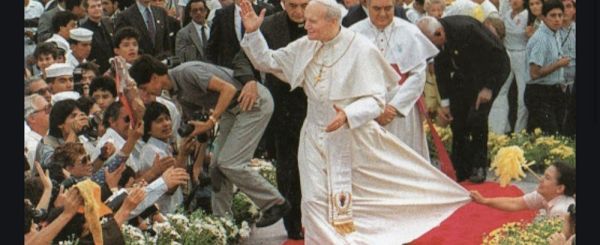6. But that 'meekness and humility of heart' in no way means weakness. On the contrary, Jesus is demanding. His Gospel is demanding. Is it not he who admonishes: 'Whoever does not take up his cross and follow me is not worthy of me'? And a little later: 'He who finds his life will lose it; and he who loses his life for my sake will find it' (Mt 10:38-39). It is a kind of radicalism not only in the language of the Gospel, but also in the actual demands of following Christ, the full extent of which he does not hesitate to reiterate often: "Do not believe that I have come to bring peace on earth; I have not come to bring peace," he says one day, "but a sword" (Mt 10:34). It is a strong way of saying that the Gospel is also a source of "disquiet" for mankind, Jesus wants us to understand that the Gospel is demanding, and that to demand means to stir consciences, not to allow them to settle down in a false "peace", in which they become more and more insensitive and dull, so that in them spiritual realities are emptied of value, losing all resonance. Jesus will say before Pilate: "I have come into the world to bear witness to the truth" (Jn 18:37). These words are also about the light that he brings to the whole field of human actions, breaking through the darkness of thoughts and especially consciences to make truth triumph in every man. It is, however, a matter of placing oneself on the side of truth. "Whoever is of the truth hears my voice," Jesus will say (John 18: 37). That is why Jesus is demanding. Not harsh or inexorably severe: but strong and unequivocal in calling everyone to life in truth.
7. Thus the demands of the Gospel of Christ penetrate the field of law and morality. He who is the "faithful witness" (Rev 1:5) to the divine truth, to the truth of the Father, says from the very beginning of the Sermon on the Mount: "Whosoever therefore transgresses one of these precepts, even the least, and teaches men to do likewise, he shall be counted the least in the kingdom of heaven" (Mt 5:19). And in exhorting people to conversion, he does not hesitate to rebuke the very cities where people refuse to believe: "Woe to you, Chorazin, woe to you, Bethsaida!" (Lk 10:13), while admonishing each and every one: ". . unless you are converted, you will perish" (Lk 13:3).
8. Thus the Gospel of meekness and humility goes hand in hand with the Gospel of moral demands, and even stern threats to those who do not wish to convert. There is no contradiction between one and the other. Jesus lives by the truth he proclaims and the love he reveals, and this is a love as demanding as the truth from which it emanates. Moreover, love placed the greatest demands on Jesus himself in the hour of Gethsemane, in the hour of Calvary, in the hour of the cross. Jesus accepted and went along with these demands to the end, because, as the evangelist warns us, he "loved to the end" (Jn 13:1). It was a faithful love, for which the day before he died he could say to the Father: "The words you gave me I have given them" (Jn 17:8).
9. As a "faithful witness" Jesus fulfilled the mission he received from the Father in the depths of the Trinitarian mystery. It was an eternal mission, included in the thought of the Father who generated him and predestined him to fulfil it "in the fullness of time" for the salvation of man - of every man - and for the perfect good of all creation. Jesus had the consciousness of this mission at the centre of the Father's creative and redemptive plan; and therefore, with all the realism of truth and love brought to the world, he could say: "When I am lifted up from the earth, I will draw all men to myself" (Jn 12:32).
[Pope John Paul II, General Audience 8 June 1988]












